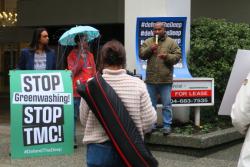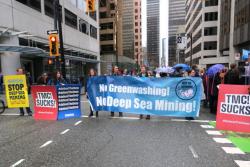(Vancouver) Indigenous Peoples and citizens from Canada and across the world have gathered during a global ocean conference in Vancouver to urge the Canadian government to support a global moratorium on deep-sea mining.
As Canada hosts the 5th International Marine Protected Areas Congress (IMPAC5) in Vancouver from 3 - 9 February 2023, people gathered outside Vancouver’s Convention Centre to shine a spotlight on one of the industry’s main players - The Metals Company. The demonstrators urged the Canadian government to use IMPAC5 as an opportunity to announce its own support for a global moratorium on deep-sea mining. A similar request for Canada to support a global moratorium on deep-sea mining in international waters and a moratorium or ban on mining in Canada’s territorial waters, was backed by 38 national and international organizations and the Deep Sea Conservation Coalition, which comprises over 100 organizations committed to defending the deep sea.
The movement towards a moratorium on deep-sea mining is gaining traction globally: Chile, Costa Rica, Ecuador, Germany, Federated States of Micronesia, Fiji, France, New Zealand, Palau, Panama, Samoa, and Spain have already come out in support of a ban, a moratorium, or precautionary pause in international waters.
Over 700 scientists have warned that deep-sea mining activities could cause irreversible, widespread environmental damage and biodiversity loss throughout the ocean, and risk disturbing the world’s largest carbon sink. Voices from the Pacific Islands and other coastal communities further warn that deep-sea mining activities could severely impact fisheries, with significant risks to culture and livelihoods.
IMPAC5 provides a critical opportunity to address the emerging threat of deep-sea mining. This year the International Seabed Authority (the intergovernmental body charged with regulating any deep-sea mining in the high seas) will meet intensively to negotiate a framework that, if agreed and adopted, would signal the start of the largest mining operation in human history. The demonstration made clear that deep-sea mining is not wanted, not needed, and not worth the risk.
-30-
Media contacts:
- Catherine Coumans, MiningWatch Canada | catherine@miningwatch.ca, +1-416-707-5986, +1-613-869-6049 (via Whatsapp)
- Nicole Zanesco, Oceans North | nzanesco@oceansnorth.ca, +1-587-573-7513
- Travis Aten, Deep Sea Conservation Coalition | travis@communicationsinc.co.uk, +1-902-219-3883
- Brandon Wei, Greenpeace Canada| brandon.wei@greenpeace.org, +1-778-772-6138
Alliance of Solwara Warriors from Papua New Guinea - Jonathan Mesulam, Spokesperson: Deep-sea mining is an experiment. There is no precedent you can refer to for understanding its likely impacts. We fear this project will have a huge impact on the local fisheries where local indigenous people fish. Also, we are shark callers, once those deep-sea mining machines start operating, they will scare the sharks, who will leave. Once we lose this, what are we going to tell the future generations—that we were once shark callers? As I keep pointing out, when we lose our culture, we lose our identity. This culture is very unique.
Blue Climate Initiative - Stan Rowland, CEO Blue Climate Initiative: One of the greatest tragedies of the race to mine the ocean is that rapidly growing alternative battery technologies and recycling opportunities make deep-sea mining totally unnecessary.
Deep Sea Conservation Coalition - Sian Owen, Director: Movement towards a moratorium on deep-sea mining is growing around the world, as countries, companies and communities realize we’re caught up in a race to mine the deep sea. Opening this new extractive frontier is the opposite of what is needed to address the joint crises of biodiversity loss and climate change. Canada must demonstrate global leadership and join this call.
Greenpeace International - Arlo Hemphil, Senior Ocean Campaigner: Following the recent reveal of TMC's spill during its test mining last October, our concerns have only deepened about what appears to be corporate self-assessment and self-regulation in a nascent industry that carries multiple environmental risks. The health of our ocean can’t depend on a for-profit company determining what is environmentally harmful or not. Governments must take back control of this process and say no to deep sea mining to safeguard a livable planet for all of us.
MiningWatch Canada - Catherine Coumans, Co-manager: Canada needs to stop sitting on the fence and take a strong public stance against deep seabed mining in international and Canadian waters. We need clear legislation banning this industrial destruction of our marine environment, such as has been passed by California, Washington and Oregon.
Oceans North - Nicole Zanesco, International Policy Advisor: The ISA is essentially a closed-door body, more focused on promoting DSM than protecting our oceans. Furthermore, The ISA hampers efforts by concerned states and observers to strengthen environmental protections that would protect swaths of the international seabed. How can the ISA be fit for purpose when it is considering approving mining before regulations are finished? How can the ISA claim to be neutral when members of the Secretariat campaign for individual mining companies? Canada has taken no leadership to prevent deep-sea mining, nor to radically improve the ISA.
Sustainable Ocean Alliance - Mark Haver, North America Regional Representative: We have a once-in-a-generation opportunity to stop a new extractive, unsustainable, destructive industry before it begins on a commercial scale. We as a global youth network stand against the destruction of the seabed, as the common heritage of humankind, and emphasize that the advancement of the commercial deep-sea mining industry is a subversion of intergenerational equity, the precautionary principle and the thousands of people calling for a moratorium. Opening up this new extractive industry will cause untold damage that current youth and future generations will be unable to repair.
Ocean Uprise - Bodhi Patil, Co-creator: We are deeply interconnected with the deep sea that is a common heritage site of all humankind. We have a duty to protect our life source - the ocean - and stop deep-sea mining before it starts.
UBC Surf - Sebastian Velasquez: Hundreds of students in Vancouver are joining the global fight to stop deep-sea mining. We see through the industry lies – and our generation is making sure the false solutions to the climate crisis stop here. We can’t have a healthy planet without healthy oceans. And we can’t have a healthy ocean with deep-sea mining.


